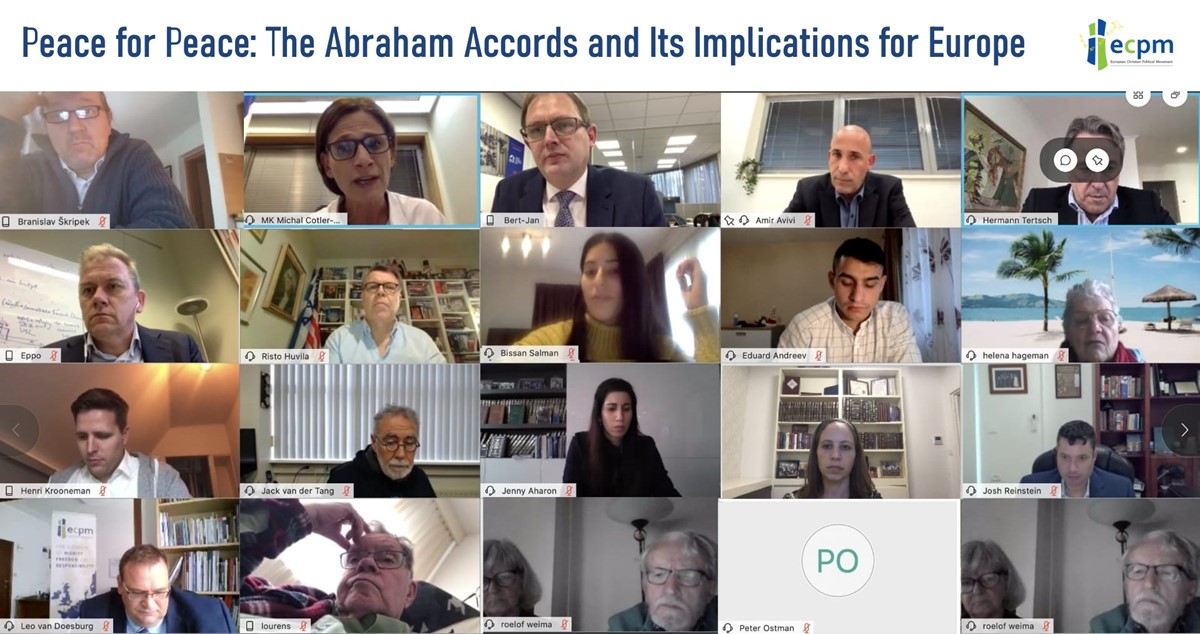
Wednesday, December 2, 2020
Peace for Peace: The Implications of the Abraham Accords for Europe
Abraham Accords: Where is Europe?
“The signing of the Abraham Accords was a historic step, but where is Europe?” This was a question that Bert-Jan Ruissen (MEP ECPM/ECR) posed at the beginning of the online conference he co-hosted with MEP Miriam Lexmann (MEP EPP/EPP) and MP Peter Östman (MP, Finnish Christian Democrats, Finland). This conference was organised by the European Christian Political Movement (ECPM) in collaboration with the Israel Allies Foundation.
The conference highlighted the importance of the Abraham Peace Accords that have been signed between Israel and the United Arab Emirates and Bahrain. The Abraham Accords recognize the importance of maintaining and strengthening peace in the Middle East and around the world based on mutual understanding and coexistence as well as respect for human dignity and freedom, including religious freedom. The peace agreements are called The Abraham Accords to highlight the fact that Arabs and Jews “are descendants of a common ancestor, Abraham. That fact and in that spirit was what prompted efforts in the Middle East for a reality in which Muslims, Jews, Christians, and peoples of all faiths, denominations, beliefs and nationalities live in, and are committed to, a spirit of coexistence, of mutual understanding and mutual respect”, said Branislav Škripek, President of the ECPM.
Josh Reinstein, President of the Israel Allies Foundation- an extensive network of Members of Parliaments from all over de world- recognized the importance of faith in these Accords as he called us to see it also “through a Biblical lens, not just a political one, and that through this model we can achieve lasting peace in the Middle East”.
MEP Miriam Lexmann spoke of the significance of the Abraham Accords “as an important step in building a new Middle East through peace, cooperation, people-to-people contact and commerce” and asked the European Union “to play a more active role in the Middle East”. This view was shared by MEP Ruissen as well who expressed his bewilderment at the lack of involvement from the European Union: “The Abraham Accords are an important landmark for increased collaboration and peace in the Middle East and set in motion new regional dynamics. Europe should be at the forefront of efforts to further promote these regional dynamics as a conciliatory actor”.
Member of Knesset Michal Cotler-Wunsh (Blue White Party) pointed to what these agreements mean for Israel as a Jewish State: “The Abraham Accords signify a potential paradigm shift taking place, as seen in the monumental pivot away from the three NOs of the 1967 Khartoum conference and towards the three YESes: yes to recognition, yes to negotiation, and yes to peace.” She added “Recognition of each other’s right to exist, in Israel’s case as Jewish and democratic, is fundamental and essential for this shift”.
Amir Avivi, CEO of the Habithonistim Movement (which is comprised of reserve and retired officers, commanders and operators from all branches of the Israeli security establishment) focused more on a new Israeli Sunni coalition that is emerging in the Middle East with its main objective “to encourage the superpowers to align with it and oppose the Iranian-Shiite coalition on one side and the Turkish-Sunni extreme coalition on the other”.
MEP Ruissen urged the European Union to become more active in fostering peace in the middle East: “the Abraham Accords make one thing very clear, namely that Europe is not yet playing any significant role in the peace process. The one-sided criticism really needs to change. “